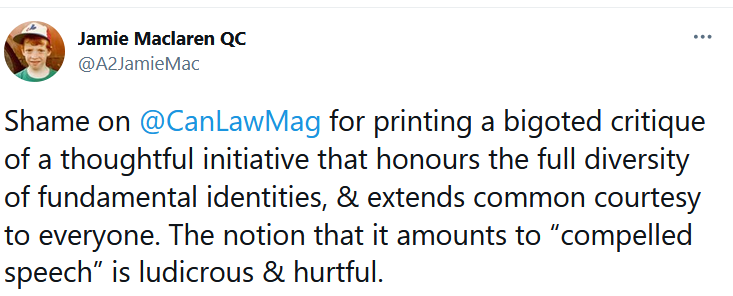
The response to the @canlawmag article on preferred gender pronouns does not reflect well on Canadian lawyers. Most of the responses were just generic accusations of transphobia but there were a few points that have enough coherence to merit a response. /2
web.archive.org/web/2021020606…
web.archive.org/web/2021020606…
“People have a right to their name and pronouns.” Names and pronouns are different. Names are personal. You have a right to choose your name and require others to use it. Pronouns are part of the shared resource of a language. Words in a language need a shared meaning. /3 

In English, the pronouns “he” and “him” describe male persons while the pronouns “she” and “her” describe female persons. Since time immemorial, male and female have been biological categories and humans have a highly evolved capacity to distinguish the two. /4
Changing the meaning of a word requires people not only to use the words but to accept the ideas conveyed by the words. When you refer to a male as “she” or a female as “he” you are accepting the idea that biological sex is less relevant than self declared gender identity. /5
The argument that people have a basic gender identity that must be respected begs the question. Not everyone believes in the existence of gender identity just as not everyone believes in a god or an the existence of the soul. /6
Pronouns are not personal but universal. Prescribed pronouns force people to change they way they think not only about the person in question but the whole world. /7
janeclarejones.com/2018/12/08/ont…
janeclarejones.com/2018/12/08/ont…
If I am forced to use the pronoun "she" to describe male persons I lose part of the language necessary to differentiate between male and female. (See Orwell's essay at the end of 1984 on the principles of Newspeak.)
orwell.ru/library/novels… /8
orwell.ru/library/novels… /8
Imposing a general obligation to use preferred pronouns also imposes compliance with a particular way of thinking about sex and gender. Freedom of thought and belief are protected by Section 2 of the Canadian Charter of Rights and Freedoms. /9
Section 15 of the Charter expressly protects against discrimination on the basis of sex. The binary nature of sex is acknowledged in s. 28 which states that rights are “guaranteed equally to male and female persons” (“les deux sexes”). /10
The artificial language used in court is already intimidating to witnesses Using arbitrary and unfamiliar language exacts a psychological cost. This cost bears hardest on some of the most vulnerable: female victims of sexual assault. /11
fairplayforwomen.com/pronouns/#:~:t….
fairplayforwomen.com/pronouns/#:~:t….
https://twitter.com/girby/status/1358500206195662849?s=20
A clever lawyer may be able to side-step the issue of pronouns by saying a "person with a penis." But sexual assault victims are often not well educated and always badly traumatized. Enforcing correct pronouns on assault victims is sheer cruelty. /12
Many criticisms of the article refer to the "misgendering" of a trans identified girl. Once again, this is an example of begging the question. There is certainly a body of opinion that gender confused children benefit from having their identity affirmed. /13
However, there is an equally strong body of professional opinion that gender confusion in children and adolescents is frequently the result of undiagnosed mental health problems and social contagion and that affirmation will push them towards harmful medical transition. /14
The final argument is why make a fuss. How does using preferred pronouns hurt you? The answer is not much, if you are a upper or middle class professional with grown or mentally healthy children. /15
But if you are a sexual assault victim, a woman forced to share intimate spaces with male bodies or a gender dysphoric child, the harm of losing the language to speak about your experience clearly is real and serious.
@threadreaderapp unroll
• • •
Missing some Tweet in this thread? You can try to
force a refresh




